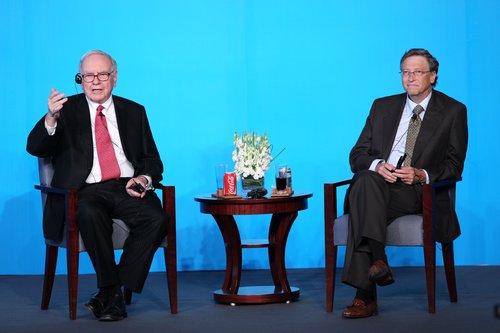
Charity as a social phenomenon
Though Chinese people are traditionally benevolent, charity is not the strong point of the rich Chinese today. After three decades of reform and opening up, the living standards of Chinese have improved, so have some people's contributions to charity. But that is far from enough.
 |
People who benefit from charity today can become benefactors tomorrow. It is important for us to learn how to pass down the help we receive today to others in need later. This is how charity at the basic level can move forward.
The media will obviously magnify the donations of billionaires and rich celebrities. But the little contributions of ordinary people are what keep society going, for it's the common people who serve as a greater and more realistic example for others to follow.
We're more likely to give when we see how easy it is
Now, people like Chen, Gates and Buffett are hoping the ripple effect that takes place at street level and on the Internet will reach the penthouse suites of billionaires, too. Spokesmen for Gates and Buffett have said the Beijing meeting is just to gather ideas, not pledges. But why not focus on ideas about how to start ripple effects, too?
 |
The cynical will point out stories about charitable organizations in this country or that country accused of misdirecting funds for the needy. But, being billionaires, the super-rich attending the Sept 29 event can surely demand that their money be spent wisely and well.
Issues of government versus private sector funding efforts to address societal needs fairly and comprehensively are also being raised. These are all important concerns in countries around the world and are likely to be raised at the banquet.

Feng Lun: Chinese entrepreneurs have done a better job than Bill Gates and Warren Buffett on philanthropy
Feng, chairman of Beijing Vantone Real Estate, gave two reasons to explain his opinion.
First, most Chinese entrepreneurs set up non-profit foundations within two decades of their start-ups. While Bill Gates established his foundation in 2000, 25 year after he created his company, and Buffett spent half a century to decide to engage in a charity career. "Therefore," Mr. Feng pointed out, "we take the ethical edge over Gates and Buffett."
 |
Foundations set up for tax evasion in the West
Duan Hongbin, a commentator with QQ.com.cn:
Wealthy people in the US can establish private funds to escape the inheritance tax because if their heirs cannot pay the tax, they have to give up their inheritance to the government. The more the inheritance is, the higher the tax. On the contrary, private funds are tax-free because they are not listed companies or profitable enterprises. It does not need to reveal its information or the process of appointment of the person in charge. Therefore, millionaires can donate their money to their private funds, and then appoint their heirs to be the real controller. In this way, they can leave their properties to their children, who won't need to pay the inheritance tax.
Charity monopoly needs to be reorganized
Ma Guangyuan, a lawyer
Charity organizations in China have been under the control of Chinese governments. Grassroots philanthropy thus has been restricted by a series of regulations. On the one hand, China longs for a sound and comprehensive charity network due to the lack of social welfare. On the other hand, due to the lack of a legal identity, grassroots foundations cannot develop smoothly.